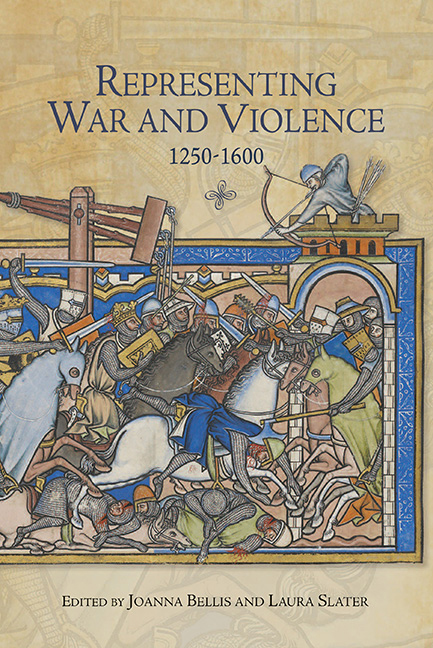Book contents
- Frontmatter
- Contents
- List of Illustrations
- Acknowledgements
- List of Contributors
- Introduction: ‘Representation’ and Medieval Mediations of Violence
- Part I The Ethics and Aesthetics of Depicting War and Violence
- Part II Debating and Narrating Violence
- Part III Experiencing, Representing and Remembering Violence
- 7 Representing War and Conquest, 1415–1429: the Evidence of College of Arms Manuscript M9
- 8 Tudor Soldier-Authors and the Art of Military Autobiography
- 9 Three Narratives of the Fall of Calais in 1558: Explaining Defeat in Tudor England
- Bibliography
- Index
7 - Representing War and Conquest, 1415–1429: the Evidence of College of Arms Manuscript M9
from Part III - Experiencing, Representing and Remembering Violence
Published online by Cambridge University Press: 05 September 2016
- Frontmatter
- Contents
- List of Illustrations
- Acknowledgements
- List of Contributors
- Introduction: ‘Representation’ and Medieval Mediations of Violence
- Part I The Ethics and Aesthetics of Depicting War and Violence
- Part II Debating and Narrating Violence
- Part III Experiencing, Representing and Remembering Violence
- 7 Representing War and Conquest, 1415–1429: the Evidence of College of Arms Manuscript M9
- 8 Tudor Soldier-Authors and the Art of Military Autobiography
- 9 Three Narratives of the Fall of Calais in 1558: Explaining Defeat in Tudor England
- Bibliography
- Index
Summary
In 1926 Benedicta Rowe published an article in the English Historical Review stimulated by her discovery, in College of Arms MS M9, of a short French chronicle written in a mid-fifteenth-century hand. This ‘contemporary account of the Hundred Years War’, as she described it, recounted English activity in France from Henry V's conquest of Harfleur in 1415 to the first appearance of Joan of Arc before Orléans in May 1429. Despite her achievement in publishing a significant article so early in her career – Rowe did not submit her Oxford B.Litt. until the following year – she expressed herself somewhat disappointed with her discovery. One reason was frustration that the chronicle ended before the career of Joan of Arc really took off, but her main reservation was that its narrative was already known thanks to its extensive use by Edward Hall in his Vnyon of the Twoo Noble and Illustre Families of Lancaster and York (1542). As Rowe concluded, ‘it must be admitted that, interesting as it is, it adds very little to our knowledge owing to the extensive use of it by Hall’.
Yet this chronicle (called here for simplicity's sake M9 although it occupies only part of the manuscript) has much to offer on how war was represented and memorialised close to the period it narrates. The chronicle as it survives today is undoubtedly linked to Sir John Fastolf (1380–1459), as is evident from the incipit on its first page in the hand of William Worcestre, Sir John's secretary, where Worcestre has made various insertions to his original text: one of these places the work in the year that Fastolf died.
Iste liber de actibus armorum conquestus regni Francie, ducatus Normannie, ducatus Alenconie, ducatus Andegavie et Cenomannie cum aliis pluribus comitatibus compilatus fuit ad nobilem virum Iohannem Fastolf baronem de Cylleguillem [inserted: in anno Christi ml iiijc lix, 1459 anno quo dictus Iohannes Fastolf obit] per Petrum Basset armigerum Anglice nacionis exercentem arma in Francia sub [inserted: victoriose (sic) principe] rege Henrico quinto [inserted: & Christoforum Hanson de patria almayn quondam cum Thoma Beaufort duce Excestrie et Luket Nantron natum de Parys unum de clericis dicti Iohannis Fastolf et per diligenciam Willelmi Wircestre secretarii predicti Iohannis Fastolf] et sub Iohanne duce Bedfordie regente regni Francie necnon aliorum principum locumtenencium sub rege Henrico sexto, in toto per spacium xxxv annorum.
- Type
- Chapter
- Information
- Representing War and Violence, 1250-1600 , pp. 139 - 158Publisher: Boydell & BrewerPrint publication year: 2016

